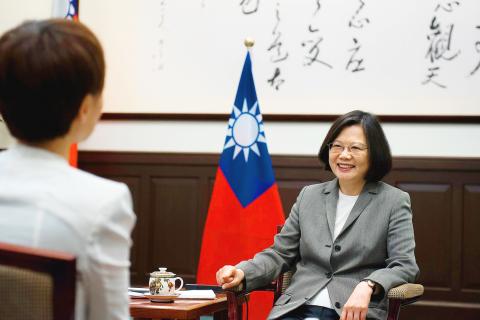Taiwan’s fears that it will become a bargaining chip between China and the US worsened on Friday after a snub by US President Donald Trump, who said he would not do anything to upset Beijing.
Trump rattled China in December last year after taking a congratulatory telephone call from President Tsai Ing-wen (蔡英文) after his election, smashing decades of diplomatic precedent.
However, after Tsai said in an interview with Reuters on Thursday in Taipei that her administration would not exclude the possibility of another telephone call with Trump, the US president said he did not want to risk his newfound “personal relationship” with Chinese President Xi Jinping (習近平).

Photo: EPA / Taiwan Presidential Office
“I think he’s doing an amazing job as a leader and I wouldn’t want to do anything that comes in the way of that. So I would certainly want to speak to him first,” Trump told Reuters in a separate interview.
Ties between Trump and Xi seem to have warmed recently after they met at Trump’s Mar-a-Lago estate in Florida earlier this month.
Since then, Trump has praised China for helping pressure North Korea over its nuclear and missile program.
Citing Tsai’s remarks, Presidential Office spokesman Alex Huang (黃重諺) on Friday said that it was “the president’s passive response to Reuters’ hypothetical questions.”
Tsai’s main point was to “stress that Taiwan and the US should maintain close communication and not rule out any possible form [of communication],” Huang said.
Chinese Nationalist Party (KMT) Legislator Chiang Wan-an (蔣萬安) called Trump’s reaction an “embarrassment” for Taiwan.
“Trump and Xi appear to have established very good relations. Taiwan needs to tread very carefully and be alert,” he told reporters.
The comments were a “serious slap in the face,” Tamkang University political analyst Edward Chen (陳一新) said. “Tsai is throwing the ball into Washington’s court and Washington is saying no.”
However, Democratic Progressive Party lawmaker Chao Tien-lin (趙天麟) said he thought Trump’s response was reasonable.
“Washington needs Beijing in handling the North Korea issue,” he said.
Concerns that Taiwan would become a bargaining chip were raised soon after Trump’s election, when he suggested he might abandon the “one China” policy that underpins US-China relations, unless he could strike better deals with Beijing.
He later went on to say he would honor the policy.
The US is Taiwan’s most powerful ally and arms supplier, despite having no official relations with Taipei after switching diplomatic recognition to Beijing in 1979.

Tropical Storm Gaemi strengthened into a typhoon at 2pm yesterday, and could make landfall in Yilan County tomorrow, the Central Weather Administration (CWA) said yesterday. The agency was scheduled to issue a sea warning at 11:30pm yesterday, and could issue a land warning later today. Gaemi was moving north-northwest at 4kph, carrying maximum sustained winds near its center of up to 118.8kph and gusts of 154.8kph. The circumference is forecast to reach eastern Taiwan tomorrow morning, with the center making landfall in Yilan County later that night before departing from the north coast, CWA weather forecaster Kuan Shin-ping (官欣平) said yesterday. Uncertainty remains and

SEA WARNING LIKELY: The storm, named Gaemi, could become a moderate typhoon on Wednesday or Thursday, with the Taipei City Government preparing for flooding A tropical depression east of the Philippines developed into a tropical storm named Gaemi at 2pm yesterday, and was moving toward eastern Taiwan, the Central Weather Administration (CWA) said. Gaemi could begin to affect Taiwan proper on Tuesday, lasting until Friday, and could develop into a moderate typhoon on Wednesday or Thursday, it said. A sea warning for Gaemi could be issued as early as Tuesday morning, it added. Gaemi, the third tropical storm in the Pacific Ocean this typhoon season, is projected to begin moving northwest today, and be closest to Taiwan on Wednesday or Thursday, the agency said. Today, there would likely

DISRUPTIONS: The high-speed rail is to operate as normal, while several airlines either canceled flights or announced early departures or late arrivals Schools and offices in 15 cities and counties are to be closed today due to Typhoon Gaemi, local governments announced last night. The 15 are: Taipei, New Taipei City, Taoyuan, Tainan, Keelung, Hsinchu and Kaohsiung, as well as Yilan, Hualien, Hsinchu, Miaoli, Chiayi, Pingtung, Penghu and Lienchiang counties. People should brace for torrential rainfall brought by the storm, with its center forecast to make landfall on the east coast between tonight and tomorrow morning, the Central Weather Administration (CWA) said. The agency issued a sea warning for the typhoon at 11:30pm on Monday, followed by a land warning at 11:30am yesterday. As of

CASUALTY: A 70-year-old woman was killed by a falling tree in Kaohsiung as the premier warned all government agencies to remain on high alert for the next 24 hours Schools and offices nationwide are to be closed for a second day today as Typhoon Gaemi crosses over the nation, bringing torrential rain and whipping winds. Gaemi was forecast to make landfall late last night. From Tuesday night, its outer band brought substantial rainfall and strong winds to the nation. As of 6:15pm last night, the typhoon’s center was 20km southeast of Hualien County, Central Weather Administration (CWA) data showed. It was moving at 19kph and had a radius of 250km. As of 3pm yesterday, one woman had died, while 58 people were injured, the Central Emergency Operation Center said. The 70-year-old